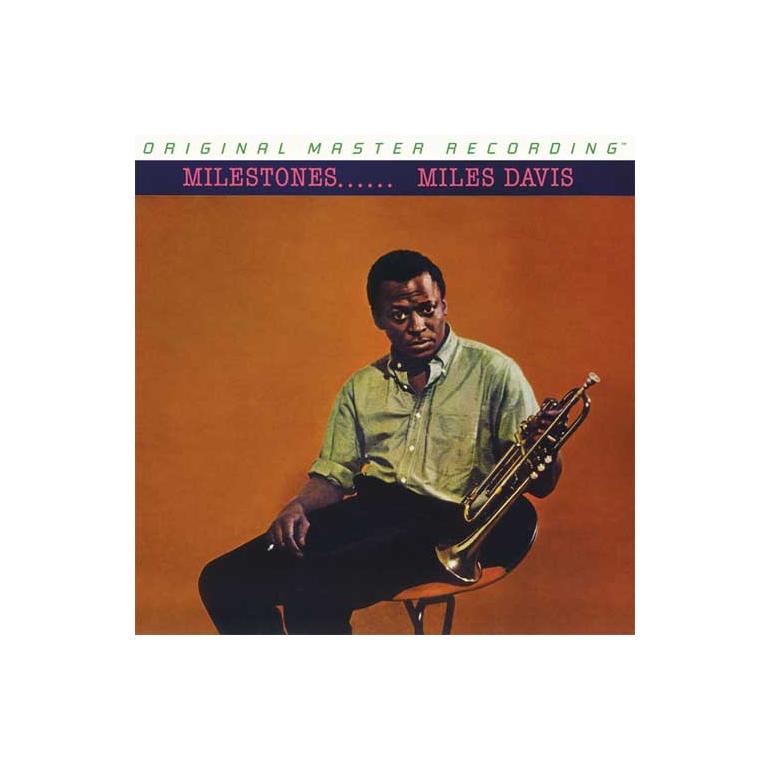Restiamo in contatto
Miles Davis - Milestones -- SACD Ibrido - Edizione limitata e numerata - OMR_MOFI - SIGILLATO
Miles Davis - Milestones -- SACD Ibrido - Edizione limitata e numerata - OMR_MOFI - SIGILLATO
OMR0176SACD
Descrizione
.gif) | .gif) | |||||||||||||
| Etichetta | Original Master Recordings Mobile Fidelity Sound Lab 2254 | Label | ||||||||||||
| Titolo | Milestones | Title | ||||||||||||
| Artista | Miles Davis | Artist | ||||||||||||
| Tracklist | VEDI descrizione (e/o foto) | SEE description (and/or photos) | Tracklist | |||||||||||
| SACD | SIGILLATO | SEALED | SACD | |||||||||||
| Box | SIGILLATO SEALED | Case | ||||||||||||
| Supporto | SACD Ibrido Può essere suonato anche su un normale lettore CD | SACD Hybrid Can be played also on a CD player | Support | |||||||||||
| Note | Made in USA | Notes | ||||||||||||
| Descrizione | Numbered, Limited Edition Hybrid Stereo SACD from Mobile Fidelity! The Link Between 'Round About Midnight and Kind of Blue: Milestones Is the Only Album Featuring Miles Davis' Original Sextet with John Coltrane, Cannonball Adderley, and More Sourced from the Dolby SR Analog Master Created from the Original Mono Master Tapes: Mobile Fidelity's Numbered-Edition Hybrid SACD Presents the 1958 Standard in Definitive Stereo Sound Miles Davis created just one studio album with his original sextet: Milestones. And he made every moment count. Pairing with Cannonball Adderley, John Coltrane, Red Garland, Paul Chambers, and Philly Joe Jones, Davis not only laid the groundwork for the modalism that immediately followed but tailored a genuine modern-jazz masterwork laden with performances among the most explosive of his distinguished career. Sandwiched between the more famous 'Round About Midnight and the epochal Kind of Blue, Milestones remains a seminal work of art. Sourced from the Dolby SR analog master created from the original mono master tapes and housed in mini-LP gatefold sleeve packaging, Mobile Fidelity's numbered-edition hybrid SACD grants each musician their own space amid broad soundstages. Colors, shapes, and dimensions appear in the manner that resembles what you'd glean from behind a studio control room's window. Davis' burnished trumpet is rendered in three-dimensional perspective and seemingly coaxes the band to play with unburdened zest. Coltrane's trademark saxophone teems with lifelike tonality and images with specificity; his solos work in tandem with and against the driving rhythms. Garland's swaggering piano lines? Visualize the keys as he hits full stride, the chords and fills slithering around skeletal frameworks. Inducted into the Grammy Hall of Fame and selected as a "Core Collection" record by the Penguin Guide to Jazz, Milestones is as famous for its title track – widely considered ground zero for modalism and bolstered by Jones' hallmark "Philly Lick" rim shot – as the players that produced it. The launching pad for many of Davis' improvisational flights, the album teases the explorations Coltrane would soon chase. Davis' own solo work broaches territories that far exceed what he had done in his bop-rooted past. Every song is a highlight. Take the bravado "Dr. Jackle," featuring a hot-foot pace and bebop strains, or "Sid's Ahead," which continues the album's blues theme while juggling edgy harmonics and inside-out structures. On "Billy Boy," distinguished with an arco bass solo from Chambers, Garland gets a turn in the spotlight and channels the openness practiced by one of his heroes, Ahmad Jamal. Even more instructive is the band's reading of Dizzy Gillespie's "Two Bass Hit." Three years removed from the version Davis and company recorded for the trumpeter's Columbia debut, this interpretation demonstrates the extent to which the group had jelled in a relatively short amount of time. Then there's "Straight, No Chaser," the definitive rendition of Thelonious Monk's signature piece. Coltrane's marbled playing pulls at the tune's borders, Adderley takes liberty with solos, and Davis dances around his mates, at one point quoting "When the Saints Go Marching In" while demonstrating his knowledge of tradition and casting an eye towards the future. About that future. Garland already had one foot out the door during the Milestones sessions to the extent Davis spells him on "Sid's Ahead." Jones would stick around for a bit longer but soon plot his exit. History proves Davis navigated the changes with visionary aplomb. Yet the chemistry, excitement, and beauty the sextet achieves on Milestones cannot be overstated. This reissue helps put the album in proper perspective – and presents the music the fidelity it deserves. Features
Musicians
Selections
| |||||||||||||
